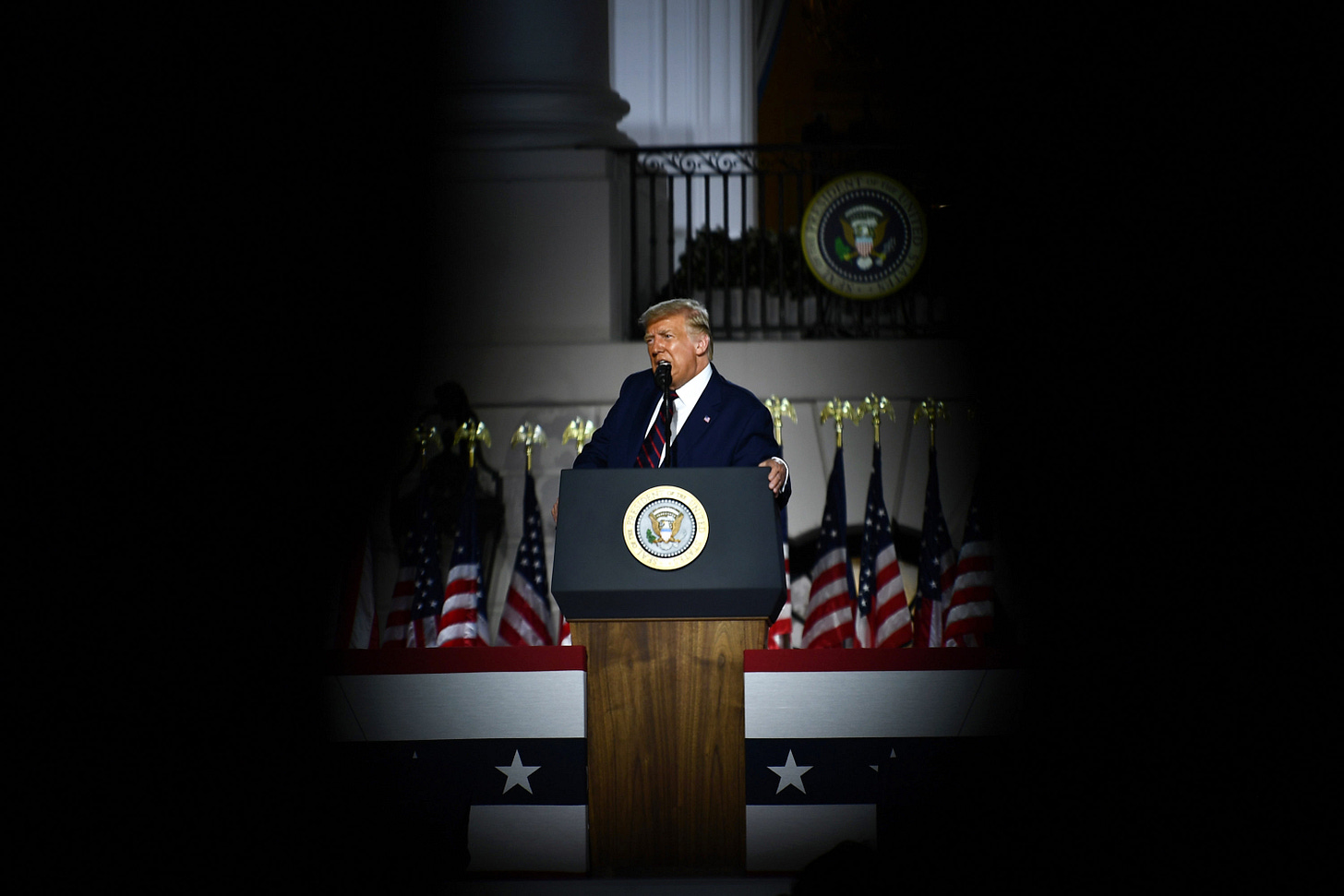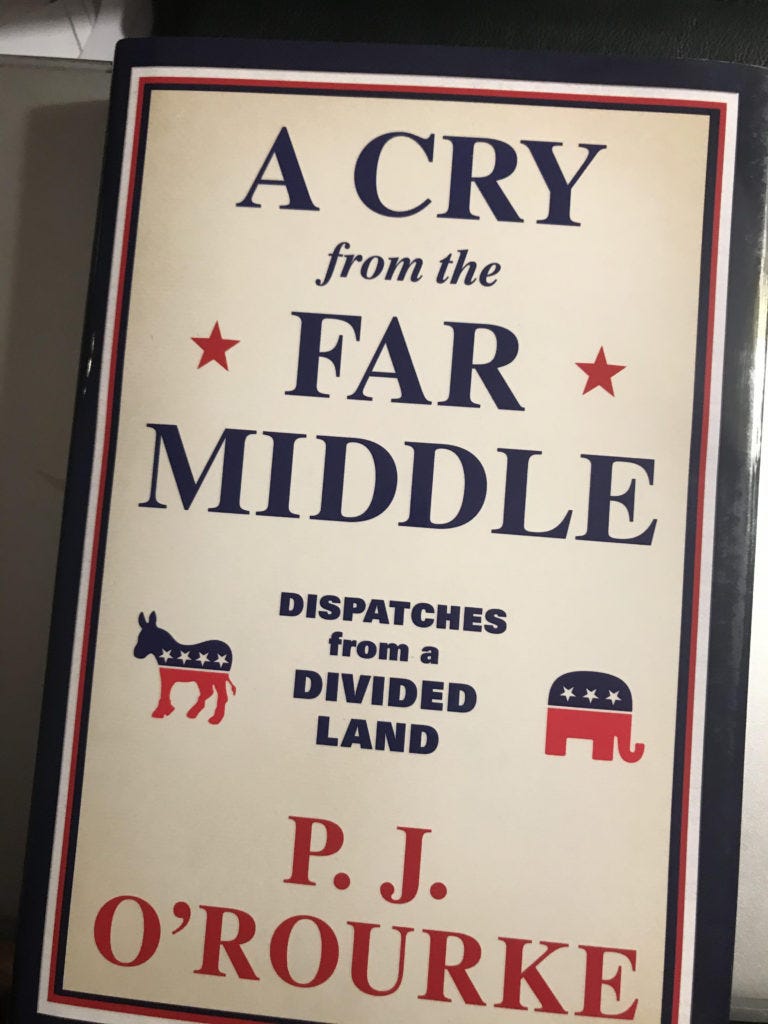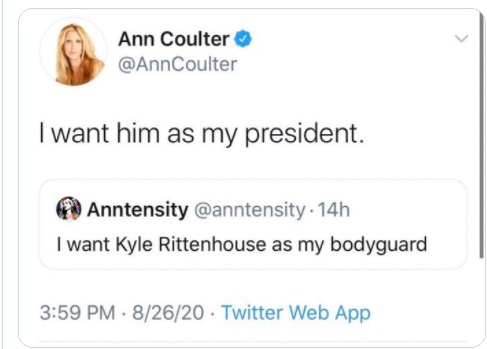We're Not All In This Together, Are We?
“Social media polarizes our politics by allowing us all—no matter how wrong we are about a political issue—to find a large, enthusiastic group of people who are even wronger.” –P.J. O’Rourke

Donald Trump spoke last night. He attacked Joe Biden He turned the White house into a political prop. He was Trump, at great length. If you want to read more you can here, here, or here.
Welcome to the Daily Countdown. We have 66 days to go until the election; and then 78 days after that until Inauguration Day
We're not really all in this together, are we?
Usually, national emergencies bring us together, at least for a moment, because we feel a common challenge and purpose. We tell ourselves that tragedies bring out the best in us. In the face of adversity, Americans stand united because that's who we are.
But this time it's not true, is it?
Yesterday, more than a thousand Americans died from the coronavirus and we are headed toward 300,000 deaths by December. In nearly any other context that many lives lost would shock the conscience of the nation. But, like so many other things, how you think about those deaths depends on your tribal, rather than national identity.
For one America, the pandemic is an on-going tragedy; millions of people have missed weddings, funerals, and graduations. They've lost loved ones; they've lost homes; they've lost jobs. The other America has events like the one we saw last night.
But this is what really hit me yesterday. Asked about the upsurge in urban violence around the country, Kellyanne Conway said: "These are Democratically-led cities and most with Democratic governors. . . . It's not Donald Trump's watch."
On one level, this feels simply like more Trumpian rhetoric, like we heard last night from the Man Himself. But stop for a minute.
Ronald Brownstein noted the deeper reveal. Her comments, he wrote, were a "incredibly explicit acknowledgement that Trump views himself as the president of red America, w/blue America more like a foreign adversary to be contained and defeated than as residents of the same country."
I'd rather not get drawn into a debate over the Electoral College here, but this division of the country into Red and Blue states shapes Trump's attitude toward millions of Americans. In his eyes, Americans are not equal citizens; they are pawns who can be sacrificed, ignored, or ridiculed on the basis of their political usefulness or irrelevancy.
So he can attack a major American city like Baltimore as a "disgusting, rat and rodent infested mess" where "no human being would want to live," because it's not in a state that counts. He doesn't need it. They are not his people.
He can threaten to withhold disaster aid from people in California, because the state didn't support him. Former DHS official Miles Taylor recounted what happened in this video for RVAT:
“On a phone call with the Federal Emergency Management Agency, he told FEMA to cut off the money and to no longer give individual assistance to California.
“He told us to stop giving money to people whose houses had burned down from a wildfire, because he was so rageful that people in the state of California … didn’t support him and that, politically, it wasn’t a base for him.”
He has repeatedly and publicly threatened California’s federal aid — including on wildfires, the topic of Taylor’s allegation. Trump has issued this threat by citing certain cities providing sanctuary to undocumented immigrants and California’s failure to meet his expectations at its border with Mexico. He at one point threatened to defund the state entirely.
And he can let politically useless Americans die. Just last month, Vanity Fair reported on Jared Kushner's failure to come up with a plan for national coronavirus testing.
Most troubling of all, perhaps, was a sentiment the expert said a member of Kushner's team expressed: that because the virus had hit blue states hardest, a national plan was unnecessary and would not make sense politically. "The political folks believed that because it was going to be relegated to Democratic states, that they could blame those governors, and that would be an effective political strategy," said the expert.
This is the context of our current moment. We are not in this together, because in the eyes of this president more than half the country is either invisible or disposable.
In the mail:

Some of my favorite bits: "What this country needs is fewer people who know what this country needs. We'd be better off, in my opinion, without so many opinions. Especially so many political opinions, including my own."
"Social media polarizes our politics by allowing us all -- no matter how wrong we are about a political issue -- to find a large, enthusiastic group of people who are even wronger."
So how are you feeling about things today? I ask because I sense a massive freak out.
We have to wait a few days to see whether the conventions have fundamentally altered the trajectory of this race, but it seems clear than the bed wetting has commenced in earnest. Part of this is substantive. The polls have shown some tightening, especially in swing states. (And Democrats are reading articles like this one. And this one.)
But part of it is psychological.
Until this week, a lot of folks thought that because a Trump victory was unthinkable, it was therefore impossible. They thought the same thing back in 2016,. We remember how that turned out, which explains the PTSD flashbacks I'm seeing all around social media.
There's another possibility as well. Many on the left have spent the last four years more or less constantly in an anti-Trump media bubble, listening to daily accounts of outrage and shattered norms from folks on CNN and MSNBC (like me). But -- bear with me here -- marinating in Rachel Maddow or Steve Schmidt's serial word-salads, might have created a somewhat distorted view of the political landscape.
This week's RNC convention was a shit show, but for a lot of Democrats, it may have been the first time they realized that Trumpism is not only out there, it is alive.
But, deep breath.
This thread by the Cook Report's Dave Wasserman is worth your time.
https://twitter.com/Redistrict/status/1299033643529236480?s=20
He notes the tightening polls, acknowledges the possibility that Biden could win the popular vote by 5 points (!) and still lose the Electoral College, and the challenges that mail-in voting poses for Democrats. But, that said, "Biden's lead to date is clearly more *stable* than Clinton's was throughout '16, with fewer undecided/third party voters. I still view him as the favorite."
"FWIW," says Wasserman, "despite what the state polling averages say, I still view Biden's path of least resistance to 270 Electoral Votes as MI, #NE02, PA and *AZ,* rather than FL or WI - based on demographic patterns and what we saw from hard votes in '18. Admittedly, it's a really close call."
As I mentioned on yesterday's podcast with David Frum and Sarah Longwell, it feels like our dystopian nightmares are on fast-forward. Frum predicted that the right-wing media would attempt to turn Kyle Rittenhouse, the 17-year-old vigilante who killed two people in Kenosha, into a folk hero.
He may have understated the case.


Fox News is also all-in. I know I'll get dragged for linking to a left-wing site like Media Matters, but they've done their homework here, documenting how Fox News figures have sided with the shooter.
It's not just Tucker Carlson. As they note: "Fox News is now mainstreaming a proposition that ought to be morally beyond the pale: that an armed 17-year old who traveled from his home in Illinois to Kenosha, Wisconsin, and killed two people during ongoing Black Lives Matter protests, was justified and somehow acting in 'defense' of either himself and/or local property."
But, but but.... Robert Tracinski makes a great point about the rest of the media's role in "sugar-coating the dark side of these protests."
There is the way they described the takeover of downtown Seattle as having a “festive” atmosphere—which Seattle’s mayor compared to the Summer of Love—and only later printed the stories of residents and business owners intimidated by lawless mobs. Or the way CNN characterized the burning of businesses in downtown Kenosha as “fiery but mostly peaceful protests.”
“Mostly peaceful protest” has become a running joke as an evasive way to describe a violent mob. Is there a big difference between a protest and a riot? Absolutely. I just wish the media would remember this and stop blurring the difference between them.
I had some thoughts yesterday on how the violence is playing in Wisconsin. You can watch here.
https://twitter.com/MeetThePress/status/1299046041677950976?s=20
Conservatives used to understand that ideas have consequences and words matter.
But in our upside-down world, Trump and his enablers have decided they don't care. Joe Biden does.
“I think he views it as a political benefit,” Biden said on MSNBC. “He’s rooting for more violence, not less.... The part that bothers me the most is the idea of just pouring gasoline on the racial flames that are burning now."
There are 66 days to go.


